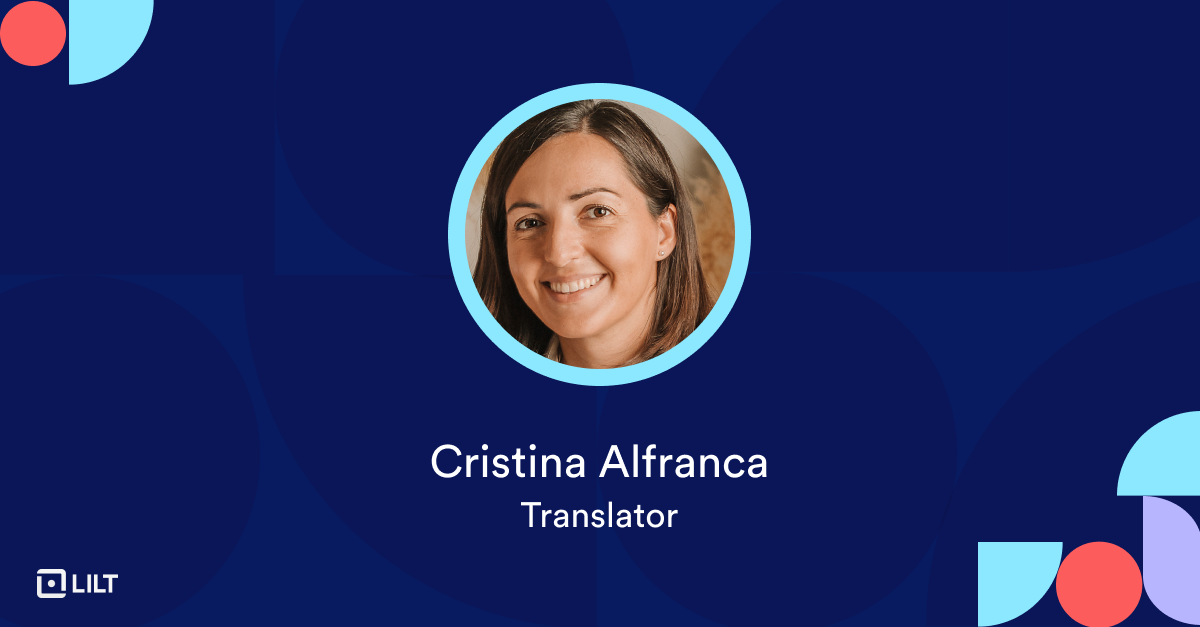Translator Community Spotlight: Meet Erika Ivene Columna

Here at Lilt, we’re focused on providing the highest quality translations possible, and that requires a large professional network of translators.
We've spent years building a community of experienced and quality translators, and we're excited to showcase the incredible individuals helping to lead the charge in building successful global experiences. Much like our Liltonian Spotlight series, we're sharing the backgrounds of the talented professionals in our community in our newest series, the Translator Spotlight Series.
.png?width=197&height=184&name=People%20Spotlights-%20Litonians%2024%20(1).png)
This week, we’re happy to introduce Erika Ivene Columna, a mother, a TV show lover, and skilled translator. We sat down with Erika to learn more about her background, how she started her translation journey, and her thoughts on the ever-changing translation industry.
What does your day to day look like?
A normal, busy day for me would be pinned in front of my computer working. But during rest days or off seasons, I would usually spend the day bonding with my 7-year-old kiddo, watching movies and YouTube videos, or playing boardgames and video games with him. Or just listening to him all day (he's a talker).
What languages do you speak or have you studied?
Filipino and English. But I would love to learn a third language, if I find the time.
How and why did you become a translator?
I started as a rewriter, virtual assistant, and then news editor all online, but there was always something missing. I've always wanted to work on something that challenged me to learn more — not just make me a step in the process of other people's work. And I wanted it to be fun at the same time.
I really thought there was no such thing. And then, one of my best friends introduced me to translation. From the outside, it definitely looks easy and no-brainer. But when you're in it, it can be really intimidating and not for the faint-hearted.
Fast forward to today, I have found myself working not only on a variety of essential documents and creative marketing content as well as subtitles for movies and TV series in most of our beloved streaming sites.
Do you like to listen to music while you work? If so, what kind?
No, but sometimes I watch while working. It may look counter-productive and untypical. But, surprisingly, I can be focused (and alert, so I won't get sleepy) when watching my "favorite series of the month" while I work.
What is your favorite non-English word and what does it mean?
Actually, I have two favorite Filipino words: "Paglaya" and "Paghilom". "Paglaya," means "to be free." The other one, "Paghilom" means "healing."
The world is deeply pained from so many hardships and difficult experiences/events that have physically, mentally, and emotionally challenged us in so many ways.
I believe that those two words are deeply interconnected. We need "paglaya" in order for us to have genuine and total "paghilom."
When you have an hour of free-time, what do you like to do to pass the time?
Watch random videos or catch up on my current TV series binge. Or chat with my best friends - most likely the latter!
What's one fact or skill that you've learned recently?
Despite the tricks I consistently learn to make my work easier, I have a tendency to push myself too hard, and still feel short. So, I need to remind myself to discard unnecessary burdens, focus in keeping myself in action, and move forward without any hesitations.
Has the translation industry changed in the last 10 years? Do you think it will change in the next 10 years?
Yes it has and I believe it still will.
Aside from the translating tools and platforms that have gone through big improvements, the industry, as a whole, has shown progress. From simple and plain translation and interpretation, the industry has welcomed machine translation, transcreation, and localizing.
People evolve and so does the language we speak, the technology we use, and the trends of conversation. And in order for translation to be relevant and appropriate, the industry needs to evolve, too.
So far, I think it's adapting well. More languages are being translated throughout the years, therefore, more communities feel included and seen, more people would then be able to understand pressing (and even entertaining) matters. Translation isn't just about making different copies or versions of documents anymore - it's more about inclusion and connection.
The linguists, on the other hand, know how to increase their creativity and resourcefulness when and where needed to make the industry current, convenient, and reliable.
Keep an eye out for our upcoming posts in both our Translator and Liltonian Spotlight posts! We'll continue to highlight people from across the company and our wonderful translator community.
Learn more by following us on LinkedIn, Twitter, and Facebook!
.png)
